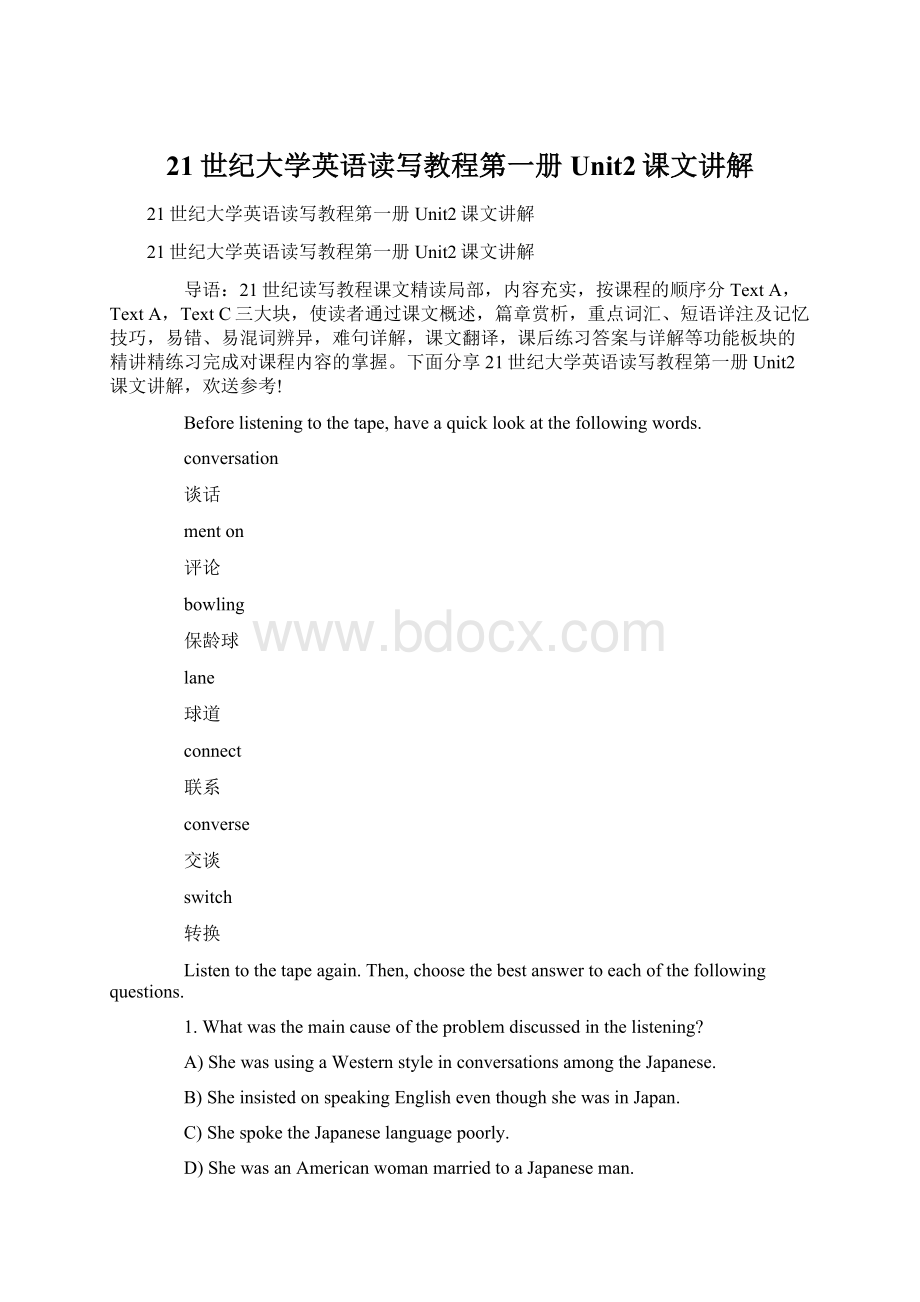21世纪大学英语读写教程第一册Unit2课文讲解Word格式.docx
《21世纪大学英语读写教程第一册Unit2课文讲解Word格式.docx》由会员分享,可在线阅读,更多相关《21世纪大学英语读写教程第一册Unit2课文讲解Word格式.docx(7页珍藏版)》请在冰豆网上搜索。

switch
转换
Listentothetapeagain.Then,choosethebestanswertoeachofthefollowingquestions.
1.Whatwasthemaincauseoftheproblemdiscussedinthelistening?
A)ShewasusingaWesternstyleinconversationsamongtheJapanese.
B)SheinsistedonspeakingEnglisheventhoughshewasinJapan.
C)ShespoketheJapaneselanguagepoorly.
D)ShewasanAmericanwomanmarriedtoaJapaneseman.
2.WhichofthefollowingparisonsdoesthelisteningmakeaboutJapaneseandWesternconversationalstyles?
A)TheJapanesestyleisliketennisandtheWesternstyleislikevolleyball.
B)TheWesternstyleismoreathleticthantheJapanesestyle.
C)TheJapanesestyleislikebowlingandtheWesternstyleisliketennis.
D)TheJapanesestyleislikesinglestennisandtheWesternstyleislikedoubles.
3.TheauthorconsiderstheWesternconversationalstyletobe.
A)moreinteractive(互动的)
B)louder
C)morepersonal
D)better
4.TheauthorconsiderstheJapaneseconversationalstyletobe.
A)easiertoadjustto(适应)
B)morestrictly(严谨地)organized
C)moretraditional
5.Theauthorconcludesthat.
A)onceyouknowthedifferences,itiseasytoadjusttothem
B)becausesheisAmerican,shewillneverreallyunderstandJapan
C)lifewillbemucheasierforherstudentsthanitwasforher
D)itremainsdifficulttoswitchfromonestyletoanother
1.Lookatthetitleandguesswhatthispassageisabout.
2.Gooverthefirstparagraphquicklyandfindoutwhotheauthoris.IssheaJapanesebornandeducatedintheUnitedStatesoranAmericanmarriedtoaJapanese?
3.HaveyouevertalkedwithanativespeakerofEnglish?
Whatproblemshaveyouencounteredintalkingwithaforeigner?
AfterIwasmarriedandhadlivedinJapanforawhile,myJapanesegraduallyimprovedtothepointwhereIcouldtakepartinsimpleconversationswithmyhusband,hisfriends,andfamily.AndIbegantonoticethatoften,whenIjoinedin,theotherswouldlookstartled,andtheconversationwouldetoahalt.Afterthishappenedseveraltimes,itbecamecleartomethatIwasdoingsomethingwrong.Butforalongtime,Ididn'
tknowwhatitwas.
Finally,afterlisteningcarefullytomanyJapaneseconversations,Idiscoveredwhatmyproblemwas.EventhoughIwasspeakingJapanese,IwashandlingtheconversationinaWesternway.
Japanese-styleconversationsdevelopquitedifferentlyfromwestern-styleconversations.Andthedifferenceisn'
tonlyinthelanguages.IrealizedthatjustasIkepttryingtoholdwestern-styleconversationsevenwhenIwasspeakingJapanese,soweremyEnglishstudentstryingtoholdJapanese-styleconversationsevenwhentheywerespeakingEnglish.Wewereunconsciouslyplayingentirelydifferentconversationalballgames.
Awestern-styleconversationbetweentwopeopleislikeagameoftennis.IfIintroduceatopic,aconversationalball,Iexpectyoutohititback.Ifyouagreewithme,Idon'
texpectyousimplytoagreeanddonothingmore.Iexpectyoutoaddsomething—areasonforagreeing,anotherexample,oraremarktocarrytheideafurther.ButIdon'
texpectyoualwaystoagree.Iamjustashappyifyouquestionme,orchallengeme,orpletelydisagreewithme.Whetheryouagreeordisagree,yourresponsewillreturntheballtome.
Andthenitismyturnagain.Idon'
tserveanewballfrommyoriginalstartingline.Ihityourballbackagainfromwhereithasbounced.Icarryyourideafurther,oransweryourquestionsorobjections,orchallengeorquestionyou.Andsotheballgoesbackandforth.
Iftherearemorethantwopeopleintheconversation,thenitislikedoublesintennis,orlikevolleyball.There'
snowaitinginline.Whoeverisnearestandquickesthitstheball,andifyoustepback,someoneelsewillhitit.Noonestopsthegametogiveyouaturn.You'
reresponsiblefortakingyourownturnandnoonepersonhastheballforverylong.
AJapanese-styleconversation,however,isnotatallliketennisorvolleyball,it'
slikebowling.Youwaitforyourturn,andyoualwaysknowyourplaceinline.Itdependsonsuchthingsaswhetheryouareolderoryounger,aclosefriendorarelativestrangertothepreviousspeaker,inaseniororjuniorposition,andsoon.
Thefirstthingistowaitforyourturn,patientlyandpolitely.Whenyourmomentes,youstepuptothestartinglinewithyourbowlingball,andcarefullybowlit.Everyoneelsestandsback,makingsoundsofpoliteencouragement.Everyonewaitsuntilyourballhasreachedtheendofthelane,andwatchestoseeifitknocksdownallthepins,oronlysomeofthem,ornoneofthem.Thenthereisapause,whileeveryoneregistersyourscore.
Then,aftereveryoneissurethatyouaredone,thenextpersoninlinestepsuptothesamestartingline,withadifferentball.Hedoesn'
treturnyourball.Thereisnobackandforthatall.Andthereisalwaysasuitablepausebetweenturns.Thereisnorush,noimpatience.
NowondereveryonelookedstartledwhenItookpartinJapaneseconversations.Ipaidnoattentiontowhoseturnitwas,andkeptsnatchingtheballhalfwaydownthealleyandthrowingitbackatthebowler.Ofcoursetheconversationfellapart,Iwasplayingthewronggame.
Thisexplainswhyitcanbesodifficulttogetawestern-stylediscussiongoingwithJapanesestudentsofEnglish.WheneverIserveavolleyball,everyonejuststandsbackandwatchesitfall.Noonehitsitback.EveryonewaitsuntilIcallonsomeonetotakeaturn.Andwhenthatpersonspeaks,hedoesn'
thitmyballback.Heservesanewball.Again,everyonejustwatchesitfall.SoIcallonsomeoneelse.Thispersondoesnotrefertowhatthepreviousspeakerhassaid.Healsoservesanewball.Everyonebeginsagainfromthesamestartingline,andalltheballsrunparallel.Thereisneveranybackandforth.
Nowthatyouknowaboutthedifferenceintheconversationalballgames,youmaythinkthatallyourtroublesareover.Butifyouhavebeentrainedallyourlifetoplayonegame,itisnosimplemattertoswitchtoanother,evenifyouknowtherules.Tennis,afterall,isdifferentfrombowling.
conversational
a.会话的,交谈的
n.aninformaltalkinwhichpeopleexchangenews,feelings,andthoughts谈话;
会谈
ballgame
n.anygameplayedwithaball球类活动
gradually
ad.inawaythathappensordevelopsslowlyoveralongperiodoftime逐渐
startle
vt.makesuddenlysurprisedorslightlyshocked使惊吓,使惊奇
halt
n.astoporpause停住,停顿
v.stop(使)停住,(使)停顿
handle
vt.dealwith处理,应付
unconsciously
ad.notconsciously无意识地,不知不觉地
challenge
vt.向…挑战;
对…质疑
n.挑战;
质疑
disagree
vi.(with)haveorexpressadifferentopinionfromsb.else有分歧,不同意
response
n.ananswer;
(an)actiondoneinanswer答复;
回应;
反响
original
a.first;
earliest起初的;
原来的
bounce
vi.(ofaball)springbackorupagainfromthegroundoranothersurface(球)弹起,(球)反弹
objection
n.sth.thatonesaystoshowthathe/sheopposesordisapprovesofanaction,idea,etc.反对,异议
forth
ad.forward;
out向前;
向外
responsible
a.havingthejobordutyoflookingaftersb.orsth.,sothatonecanbeblamedifthingsgowrong须负责的,有责任的
n.保龄球
relative
a.havingaparticularqualitywhenparedwithsth.else相对的,比拟的
n.amemberofone'
sfamily;
relation亲属;
亲戚
previous
a.ingbeforeintimeororder先前的'
,以前的
junior
a.oflowerrankorposition;
younger级别或地位较低的,年资较浅的;
年少的,较年幼的
bowl
vt.把(球)投向球瓶
n.球道;
车道;
胡同,小巷
pin
n.球瓶;
大头针,别针
register
vt.record记录,登记
suitable
a.适宜的;
适当的
impatience
n.不耐烦;
急躁
*snatch
vt.getholdof(sth.)hastily;
takeinahurry,esp.forcefully抓住;
夺,夺得
alley
n.小巷,小街,胡同;
球道
bowler
n.投球手
apart
ad.intopieces成碎片
parallel
a.runningsidebysidebutnevergettingnearertoorfurtherawayfromeachother平行的,并列的
vi.change改变,转移
PhrasesandExpressions
Joinin
takepartin(anactivity)参加,参与
etoahalt
stop停住,停顿;
停顿
evenif/though
inspiteofthefactthat;
nomatterwhether即使;
尽管
justas
正如;
同样地
backandforth
来回地,反复地
andsoon
andotherthingsofthiskind等等
knockdown
make(sth.)fallbyhittingorpushingit击倒;
撞倒
fallapart
break;
falltopieces;
endinfailure破裂;
破碎;
以失败告终
callon/upon
formallyask(sb.)todosth.号召;
请求
referto
mention;
speakabout谈到,提及
afterall
whenallissaidordone毕竟
ProperName
NancyMastersonSakamoto
南希·
马斯特森·
坂本